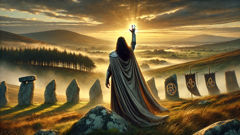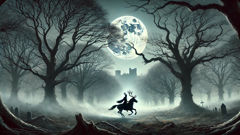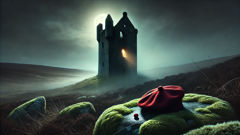Introduction
Across the emerald tapestry of ancient Ireland, beneath skies veiled in shifting mists and whispers of legend, a tale was born that would echo through the centuries: the legend of Nuada Airgetlám, the Silver-Handed King. In a time when magic coursed through the land as surely as rivers threaded the hills, the Tuatha Dé Danann arrived upon Eire’s western shores, bearing wisdom, art, and power unknown in mortal realms. At their head was Nuada, a king noble and just, whose eyes reflected both the peace he sought and the storms he’d weather. Yet in the shadow of his greatness stood a prophecy, for in this world, no triumph comes without sacrifice. From the dawn-lit valleys to the mist-shrouded fortresses of Tara, Nuada’s destiny was shaped by conflict—against the Fir Bolg, who claimed the land before them, and later against the monstrous Fomorians who hungered for dominion. Through the clash of armies, the song of druids, and the silent work of fae healers, the fate of a king entwined with the fate of a people. For when Nuada lost his hand in battle—a wound that cost him both his throne and his sense of self—the soul of Ireland itself seemed to hang in the balance. Yet, where loss threatened to consume, hope and ingenuity kindled anew. In the smithies of the gods, a marvel was born: a hand of gleaming silver, both beautiful and strong, fashioned by the legendary Dian Cecht and the cunning craftsman Creidhne. Nuada’s journey is more than a tale of war and rule; it’s a chronicle of resilience, renewal, and the unbreakable spirit of a leader who discovered that true kingship lies not in perfection, but in perseverance. The Silver Hand became more than a symbol—it became a beacon for all who find themselves remade by adversity. Step into a world where magic and myth shape destiny, and witness how one king’s struggle forever changed the heart of Ireland.
The Arrival of the Tuatha Dé Danann and the Dawn of Destiny
Long before the world was mapped or measured, Ireland was a land where the impossible seemed natural and the natural, miraculous. Into this realm of ancient forests, stone circles, and wind-bent hills came the Tuatha Dé Danann—a people not quite gods, not quite mortals, bearing knowledge and art far beyond the island’s shores. Their arrival wasn’t heralded by ordinary ships, but by a fleet shrouded in mystical fog. The sea itself seemed to part in awe, allowing them to slip between worlds and step upon the dew-laden grass as if their very presence summoned spring’s rebirth.

At their helm rode Nuada, son of the goddess Danu and high king by birthright and acclaim. Tall and broad, his gaze was kind yet resolute. In his court, the wise gathered—druids, warriors, healers, and smiths, each carrying an art or secret lost to the old world. Among them walked the fierce Morrigan, whose ravens prophesied fate; Lugh, bright with cunning; and Dian Cecht, master of healing arts. They carried with them the Four Great Treasures—artifacts of unimaginable power: the Stone of Fál, the Spear of Lugh, the Sword of Light, and the Cauldron of Dagda.
But as with all newcomers, their landing sparked unease. Ireland was not empty. The Fir Bolg—descendants of earlier settlers—ruled its valleys and mountains. At the Hill of Tara, beneath the watchful stars, Nuada sent envoys, hoping for peace. Yet the Fir Bolg, proud and wary, refused to yield land or honor to these mysterious strangers. Words gave way to sword, and destiny thundered toward the First Battle of Mag Tuired.
The morning of battle was thick with anticipation. Warriors painted their faces with blue woad and plaited spells into their braids. Druids chanted as ravens circled overhead, their cries a chorus of doom and hope. Nuada strode at the vanguard, his shield emblazoned with the emblem of Danu. In his heart, the desire for harmony warred with the knowledge that blood must be spilled for a future to be forged.
The battle raged across meadows trampled into mire. Fir Bolg and Tuatha Dé Danann met in a clash of steel and sorcery. Nuada fought at the fore, his blade flashing in the rising sun. Through waves of chaos, he carved a path toward the Fir Bolg champion, Sreng—a warrior whose axe was legend. Their duel was fierce and desperate, echoing the fate of two peoples. Nuada’s sword met Sreng’s axe, the ring of metal carrying over cries of victory and anguish. But in one fateful blow, Sreng’s axe cleaved through Nuada’s shield and struck his left arm at the shoulder, severing his hand. Blood spattered onto the stones, and a hush fell as Nuada staggered.
It was not just a wound of flesh. In the law of the Tuatha Dé Danann, a king must be whole, body and soul. As Nuada’s lifeblood seeped into the earth, so too did his right to rule. Even as he led his people to victory—forcing the Fir Bolg to retreat and securing their place in Ireland—Nuada felt the weight of loss settle around him. The warriors who had cheered his courage now cast uncertain glances. He remained their hero, but could he be their king?
In the aftermath, as the mists rolled in and battle-scarred men and women tended their wounded, Nuada retreated to the stone halls at Tara. There, with his arm bound and his spirit heavy, he sat among the stones, wondering if fate had brought him across the sea only to dash his hopes upon Ireland’s green shores. Yet even in pain, he would not yield to despair. For Nuada knew that sometimes the gods test their chosen, and that greatness is often forged in suffering. The seeds of transformation had been planted, though none yet could see what marvel might grow.
The Silver Hand Forged and the Struggle for Kingship
Days after the battle, while wounds festered and spirits ached, the healers of the Tuatha Dé Danann gathered around their stricken king. Nuada’s arm was bound in linen soaked with salves of honey and bog-myrtle. Dian Cecht, the chief physician, worked tirelessly to ease his pain, but no magic could restore what had been lost. The court murmured in anxious clusters—could a king with only one hand sit upon the throne?
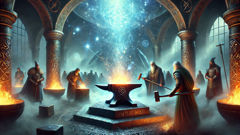
According to the ancient Brehon Laws, a leader must be physically whole. No matter Nuada’s wisdom or valor, he could not rule so wounded. Some said it was the gods’ will; others whispered it was jealousy, that fate resented mortal greatness. After much sorrow, Nuada made the hardest choice: he stepped down as king, yielding the throne to Bres, a noble of mixed Tuatha Dé Danann and Fomorian blood. With a heavy heart, Nuada retreated into silence, his hand missing, his future uncertain.
Bres took power, but with his rise came hardship. He was a king in name, but not in spirit. His reign grew cold. He taxed his people harshly, sent warriors to toil rather than train, and offered no tribute to the poets or musicians. The land itself seemed to sicken; crops withered, rain fell in sheets, and discontent smoldered among the Tuatha Dé Danann. Even Bres’s own mother mourned the loss of joy in Tara’s halls.
Nuada watched from the shadows as the once-glorious court faded. But hope flickered in the hearts of his loyal kin. Dian Cecht would not abandon his king. In secret, he conspired with his gifted son Miach and the master smith Creidhne to restore Nuada’s wholeness. Night after night, they toiled in a chamber lit by blue flames and the tang of metal. Silver was chosen for its purity and magical resonance—a gift worthy of gods and mortals alike.
Miach’s hands danced over flesh and sinew, while Creidhne shaped the molten metal with delicate hammer blows. Together, they fashioned a hand that was both beautiful and functional—fingers jointed and strong, the surface etched with runes for healing and power. When at last it was ready, Dian Cecht performed a rite of binding, merging silver and living flesh. The pain was fierce, but Nuada endured it without cry or complaint. When dawn broke over Tara, he gazed down and saw his new hand glimmering in the golden light.
News spread swiftly: Nuada was whole again. The poets composed verses to his transformation, and old warriors sang of his steadfastness. Yet Bres, fearful of losing power, clung to his throne. A council convened, with elders and druids debating whether a hand of silver could truly count as wholeness. It was Lugh—young, clever, shining with promise—who spoke for renewal: "A king’s worth is not measured only by flesh and bone, but by heart and courage. If Nuada’s hand holds the scepter as firm as any flesh, why should he not rule?"
The people cheered. At midsummer, beneath the Stone of Fál, Nuada reclaimed his crown. Bres was deposed—sent to seek aid from his Fomorian kin, who brooded beyond the sea. For a time, peace returned to Tara. Nuada ruled with newfound wisdom, his silver hand a constant reminder of both loss and hope. He invited poets back into the halls, restored just tribute to every trade, and saw to it that no song was silenced for lack of bread or honor.
But in the shadows, resentment simmered. Bres, wronged in his own eyes, plotted revenge, and from the cold northern isles, the Fomorians stirred. Ireland’s fate would soon rest again on the choices of the Silver-Handed King.
The Return of Nuada and the Battle for Ireland’s Soul
Peace under Nuada’s renewed rule brought music and plenty back to Tara. Yet Bres—his pride wounded and ambition undimmed—sought vengeance among the Fomorians. These ancient foes were monstrous in form and cruel in spirit, commanding storms and darkness. Their king, Balor of the Evil Eye, possessed a gaze that could wither armies and turn stone to dust. Bres promised tribute and servitude if they’d help him reclaim his throne. The Fomorians agreed, their ships soon crowding Ireland’s northern shores.
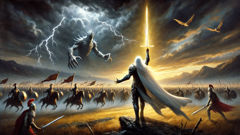
A reign of terror followed. The Fomorians demanded crushing tribute: gold, cattle, grain, and even children for servitude. The land mourned beneath their tyranny. Rivers ran sluggish, the very air thickened with dread, and hope flickered only in secret songs whispered around peat fires. Nuada, older and tempered by suffering, refused to submit. He called upon his court: Lugh of the Long Arm, the Dagda with his cauldron, Ogma the champion, and the fierce Morrigan, who prophesied doom or victory.
Lugh stood out—a youthful hero descended from both Tuatha Dé Danann and Fomorian lines. With every craft and art at his command, he brought fresh hope to the court. Nuada recognized greatness in him and welcomed him as an equal. Together, they roused Ireland’s defenders, forging alliances among once-divided tribes. Druids cast wards to cloak armies; smiths sharpened swords that shimmered with runes; healers readied salves for wounds yet to be dealt.
The Second Battle of Mag Tuired drew near, and with it, a storm as fierce as any before or since. The Fomorians advanced, their banners emblazoned with monstrous forms. The Tuatha Dé Danann arrayed themselves on the open plain—Nuada at their center, his silver hand raised in defiance. Lugh flanked him, radiant and eager. Across the field, Balor loomed—a titan with a single deadly eye.
At first light, the sky darkened with clouds and ravens. The ground shook beneath charging feet. Magic and steel collided in cacophonous fury—fire arced through the air, while druids summoned mists to blind foes. Nuada fought with unmatched skill, his silver hand gleaming as he struck down Fomorian champions. The hand’s magic made him tireless; its grip was steady, never faltering even as chaos raged around him.
But fate was not yet satisfied. In the thickest moment of battle, Nuada faced Balor himself. The giant’s eyelid drooped shut by heavy weights; his warriors guarded him as he advanced. Nuada fought valiantly, but Balor’s power was overwhelming. With a roar, Balor’s eye was pried open—a beam of searing energy lanced across the field, striking Nuada down. The king fell, his silver hand still clutching sword and shield as his spirit hovered between worlds.
It was then that Lugh rose to fulfill prophecy. With Nuada’s blessing echoing in his heart, Lugh hurled his spear straight and true into Balor’s evil eye. The Fomorian king toppled, darkness lifting from the land as if a veil had been torn away. The Fomorians fled in terror; their ships scattered by storms conjured by the Morrigan herself.
Nuada’s sacrifice was honored in song and memory. Though his body fell upon Mag Tuired’s field, his legacy endured. Lugh was crowned king, but always paid tribute to Nuada—who had shown that leadership was born not only from power, but from wisdom, endurance, and the courage to trust in others. The Silver Hand, preserved in Tara’s treasury, became a symbol for all Ireland: proof that loss can be remade into hope, and that even the deepest wounds may yield wonders yet unimagined.
Conclusion
From misty beginnings to the fires of battle and bittersweet triumph, the legend of Nuada Airgetlám endures as one of Ireland’s most profound stories of hope and renewal. His journey from noble king to wounded exile and back again—remade by both pain and magic—reminds us that greatness isn’t measured by perfection or unbroken strength. It’s shaped by resilience, humility, and the courage to accept help when fate wounds us. The Silver Hand became a symbol not only for kingship but for all who must find new purpose after loss. In every Irish valley where mists gather and ravens cry, Nuada’s memory lives on. His example speaks to every heart scarred by adversity: we can emerge from darkness not diminished, but transformed. The tale of Nuada of the Silver Hand will always glimmer on the edge of myth and memory, reminding us that even shattered destinies can be reforged into something shining and new.

